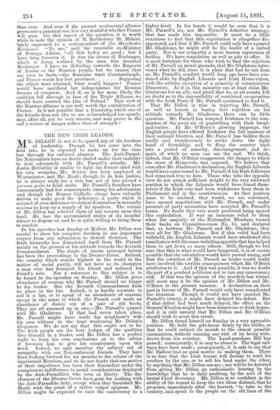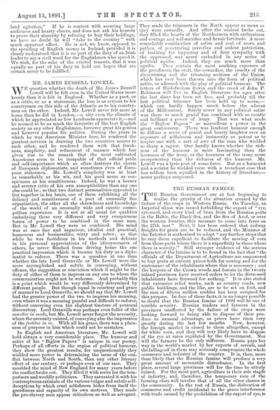THE NEW IRISH LEADER.
MR. DILLON is not to be spared any of the burdens of leadership. Though he has come into the field late, he is expected to make up for the time lost through his enforced absence. The Anti-Parnel- lite Nationalists have no doubt chafed under their inability to deal adequately with Mr. Parnell's attacks. Mr. • Justin McCarthy is unable to fight his former chief with his own weapons, Mr. Sexton has been employed at Westminster, and Mr. Healy, though, to do him justice, he is always ready for a row, has not of late proved a persona grata to Irish mobs. Mr. Parnell's Sundays have consequently had few counterparts among his adversaries, and though the Roman Catholic clergy have valiantly striven to make good the deficiency, a party which is accused of over-deference to clerical domination is naturally anxious to keep up a supply of lay speakers. The release of Mr. Dillon has relieved them of any anxiety upon this head. He has the accumulated stores of six months' silence to dispose of, and he is quite willing to bring them to market.
In his speeches last Sunday at Mallow, Mr. Dillon was careful to show his complete freedom in one important respect from any submission to clerical dictation. The Irish hierarchy has dissociated itself from Mr. Parnell mainly on the ground of his attitude towards the Seventh Commandment. The staple of recent episcopal letters has been the proceedings in the Divorce Court. Ireland, the country which stands highest in the world in the matter of social purity, will not have as its champion a man who has betrayed his friend and seduced his friend's wife. Not a reference to this subject is to be found in the speeches on Sunday. Mr. Dillon gives abundance of reasons why Mr. Parnell should no longer be his leader. But the Seventh Commandment finds no place in the list. Indeed, it is hardly accurate to call it a list, or to speak of an abundance of reasons, except in the sense in which the French cook made an abundance of dishes out of a pair of old boots. They are all summed up in one,—Mr. Parnell's quarrel with Mr. Gladstone. If that had never taken place, Mr. Parnell might have made his neighbour's wife his own without in the least weakening Mr. Dillon's allegiance. We do not say that this ought not to be. The Irish people are the best judges of the qualities they demand in a leader, and Mr. Dillon has a perfect right to form his own conclusions as to the advice it becomes him to give his countrymen upon this head. Indeed, we only mention the subject out of sympathy with our Nonconformist friends. They have been looking forward for six months to the release of the imprisoned Members, and we do not doubt that one motive of their impatience has been their discomfort under the conspicuous indifference to moral considerations displayed by the Anti-Parnellites who were at liberty. The dis- closures of the Divorce Court have gone for nothing with the Anti-Parnellite laity, except when they furnished Mr. Healy with the point of a rather vulgar epigram. Mr. Dillon might be expected to raise the controversy to a higher level. In his hands it would be seen that it is Mr. Parnell's sin, not Mr. Parnell's defective strategy, that has made him impossible. It must be a little vexatious to find that this expectation is altogether dis- appointed, and that if Mr. Parnell could only have squared Mr. Gladstone, he might still be the leader of a united party. Nor is our sympathy a mere barren expression of feeling. We have consolation as well as pity to offer. It is most fortunate for those who wish to base the rejection of Mr. Parnell on moral grounds, that Mr. Gladstone inter- vened when he did, since it is plain that had he not done so, Mr. Parnell's conduct would long ago have been con- doned alike by English Liberals and Irish Home-rulers, with the solitary exception of a minority of conscientious Dissenters. As it is, this minority can at least claim Mr. Gladstone for an ally, and plead that he, at all events, felt no doubt as to the impossibility of continued co-operation with the Irish Party if Mr. Parnell continued to lead it.
That Mr. Dillon is wise in rejecting Mr. Parnell, as well as honest in basing that rejection on his attitude towards Mr. Gladstone, there can be little question. Mr. Parnell has tempted Irishmen to the com- mission of the great sin of quarrelling with their bread- and-butter. In Mr. O'Brien's glowing language, the English people have offered Irishmen the full measure of their national liberties, and Mr. Parnell has bidden them madly and treacherously to strike down the right hand of friendship, and to fling the country back into a period of anarchy, discouragement, and de- spair, of which no man can see the end. We think, indeed, that Mr. O'Brien exaggerates the danger to which the cause of Home-rule was exposed. We believe that even after Mr. Gladstone's declaration, the English Liberals would. have come round to Mr. Parnell if his Irish followers had remained. true to him. Those who take the opposite view do not attach sufficient weight to the very awkward position in which the Liberals would have found. them- selves if the Irish vote had been withdrawn from them in Parliament and in the constituencies. As that position came to be realised, they would, we are convinced, have opened negotiations with Mr. Parnell, and under pressure of party necessities have accepted Mr. Parnell's terms. No doubt they very much preferred being spared. this capitulation. It was an immense relief to them when the majority of the Nationalist Members turned. their backs on Committee-room No. 15, and. declared that, as between Mr. Parnell and Mr. Gladstone, they were all for Mr. Gladstone. But if this relief had been withheld, the English Liberals would. have swallowed this humiliation with the same unfailing appetite that has helped them to get down so many others. Still, though we feel sure that this is what would. have happened., it is of course possible that the calculation would have proved wrong, and that the retention of Mr. Parnell as leader would. really have involved. the terrible consequences which Mr. O'Brien attributes to it. And if this was possible, it was no doubt the part of a prudent politician not to run any unnecessary risk. If this was the opinion of the seceders last winter, still more may it be the opinion of Mr. Dillon and Mr. O'Brien in the present summer. A declaration on their part in favour of Mr. Parnell would. only have complicated the situation. Though it would not have ensured Mr. Parnell's victory, it might have delayed his defeat. But if that defeat had been much delayed, the effect on the General Election might have been disastrous to Irish hopes ; and it is only natural that Mr. Dillon and. Mr. O'Brien should wish to avert this result.
Mr. Dillon found himself on Sunday in a very agreeable position. He held the 'gift-horse firmly by the bridle, so that he could subject its mouth to the closest possible examination, without running any risk of its being with- drawn from his scrutiny. The Land-purchase Bill has passed ; consequently, it is easy to abuse it. The legal rail- ways have been made ; consequently, it is safe to say that Mr. Balfour had no good motive in making them. There is no fear that the Irish tenant will decline to send his produce by the one, or to sell his land under the other, by anything that Mr. Dillon can say; nor will he be deterred from giving Mr. Dillon an enthusiastic hearing by the knowledge that he is daily profiting by the acts of the brutal Chief Secretary. Mr. Dillon is so confident in the ability of the tenant to keep the two ideas distinct, that he proposes, immediately after the harvest, "to take to the country, and speak to the people on' the old lines of the land agitation." If he is content with securing large audiences and hearty cheers, and does not ask his bearers to prove their sincerity by refusing to buy their holdings, we have no doubt he will "take to the country" with much apparent effect. He is not, we know, opposed to the spending of English money in Ireland, provided it is clearly understood that it is no part of the duty of an Irish leader to say a civil word for the Englishmen who spend it. We wish, for the sake of the evicted tenants, that it was equally no part of his duty to hold out hopes that are certain never to be fulfilled.



































 Previous page
Previous page